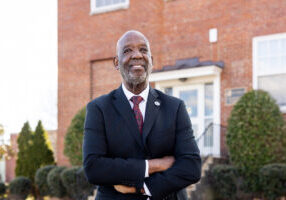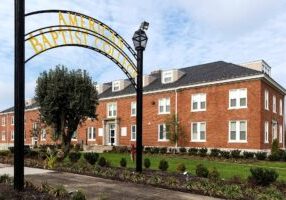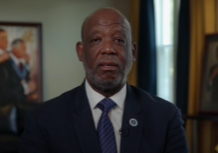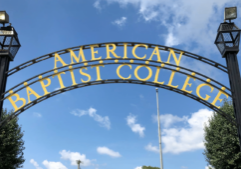The Resurrection Message from Dr. Forrest E. Harris Sr., President of American Baptist College
As a Christian Liberal Arts College, American Baptist College celebrates with Christians worldwide the crucifixion and resurrection of Jesus Christ. This event occurred in the first century at the hands of the imperial powers of the Roman Empire. The world of Roman emperors, authority, political dominance, and exploitation stood at that time as a permanent reality, definition of life’s possibilities, spiritually and socially. Symbolically, Pax Romana’s claim (Latin for “Roman Peace”) was a promise of sustained prosperous stability and power under Roman imperialism. It was a world system maintained by the militarism, wealth of emperor Caesar Augusta and the false claims of safety for all Roman citizens and indentured subjects of the empire. In a small Judean province of the empire was a colony of powerless Jews whose identity as people of God was under siege. Their identity as Jews was bound up in the land God promised to them through a covenant with their ancestors Abraham, Isaac, and Jacob. In their history, after centuries of bondage in Egypt, Babylonian, and Assyrian exile, they believed if they lived in accord with God’s covenant, God would liberate them. And from Roman oppression, and institute a reign of justice. They lived with the idea of one God, a single sacred principle of creation and morality of the world. Their covenant and history with God were their last defense against the exploitation of Rome.
Jesus grew up in the Jewish tradition of seeing God’s spirit and immanence everywhere in the natural world and everyone from the least to the greatest to children. In a small province in the Roman empire to Mary and Joseph, Jesus was born. From his birth, throughout his adult life to his death on a Roman cross, Jesus’ life became the embodiment of the sacred principle of life, one God, one creation, one existence in the kingdom of God. The commitment and practice of that holy principle, the kingdom of God, clashed with the imperial world of the Roman empire. Jesus came to see God’s kingdom not simply as a hope-for future, but moment by moment, God’s kingdom was reshaping and recreating the world and humanity. For Jesus, it was Divine presence, power, and already presence in the people’s lives, affecting the lives of children, the treatment of the poor, and the transformation of life in the world with love, justice, and peace. The Divine transformation of life was a personal conversion and public commitment to transformation and ethic of compassion, forgiveness, and love in daily life. Jesus made God’s kingdom into the foundation of what he said and did. It was an inclusive vision for the marginalized life of women, racialized Samaritans, the lepers, the poor, and the socially outcast. Jesus’ full endorsement of the Kingdom of God’s principle of justice, love, and peace for everyone and institutions, even toward Israel’s enemies, created political and religious conflict. The convergence of the politics of Roman imperialism, the Temple politics, and tensions within Judaism led to Jesus’ brutal crucifixion on a Roman cross. But by the power of God, the life, the immortal truth, the compassionate, non-violent love ethic of Jesus’ kingdom vision, God raised Jesus from the dead. We celebrate with resurrection faith that Jesus lives eternally for the transformation of life and the world’s re-creation in God’s love and justice.
In our political, social, and modern spiritual context, here is the question for our faith to ponder. Do we accept God’s kingdom ethic of love and justice as possible for the re-creation of America and for our personal and public lives? What role can we play in the transformation and recreation of the world in the love ethic of Jesus? The climate of empire politics, social threats, religious controversy, racial exclusivism, and political divisions characteristic of the first-century Roman world that led to Jesus’ crucifixion are present in modern America and worldwide. Social sins: “Politics without principles, business without morals, wealth without work, education without character, science without humanity, entertainment without responsibility, religion without sacrifice or justice” have led to the personal choice and acceptance by politicians, corporate, church leaders, ethnicities, and people of various religious persuasions, a Roman-type world of power, status-quo politics, materialism, and individualism.
However, American Baptist College stands in a Christian faith tradition that affirms the re-creation, potential hope of new life, a new world of love and justice. We promote education and Christian service after the example and model of Jesus’ love ethic of love “to do justly, love mercy and walk humbly with God.” We live with resurrection faith, the possibilities of life beyond the cruelty, contradictions, and personal and corporate sins. Through education, biblical and theological understanding of justice, and leadership, we believe by the power of God the transformation of life is possible. To open up students to the spirituality of Jesus’ idea of a new life against all forms of oppression in personal and institutional life that stand against the coming of God’s kingdom is our mission.









